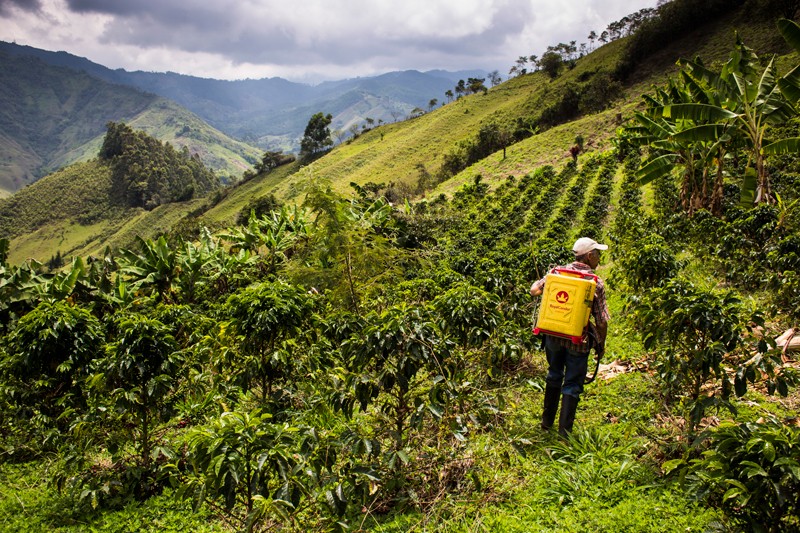My research with coffee farmers in Colombia aims to understand how their communities are harmed by environmental pressures and what resources they need to adapt. For these farmers, growing crops is more than a job. It is their way of life. The Coffee Cultural Landscape of Colombia is a World Heritage Site — designated by the United Nations cultural organization UNESCO — honouring the generational tradition of farming in this region. The landscape consists of 18 urban settlements dating back to the nineteenth century, with coffee farms situated on steep mountain ranges, often in forest clearings.
But owing to climate change, these farmers report that their livelihoods and heritage are threatened by changes in temperature, more extreme weather events, increases in pests and disease and their inability to plan production decisions (such as when to harvest coffee cherries) on the basis of historical indicators that have been altered1, and that they feel they have no way to successfully adapt2. Although they are experienced farmers who often have the wisdom of generations of coffee farming in their families, they do not have the support that they need to overcome the challenges presented by climate change. They need more information, institutional support and financial stability.
To tackle some of these issues, my team and I created Clima Y Cafe, a website that aims to support these farmers by addressing their interests and the political and economic pressures they face. While testing the site with the farmers, we found that the thing they most wanted was practical and actionable information and advice that they could understand and implement immediately.
Some wanted to know, for example, how to determine when to harvest and how to control increasing pests and diseases wrought by a shifting climate. Others wanted to know how to predict the shifting seasons, what they could do to shade their plants and protect the soil, and which coffee varieties might better endure these changes. Some asked whether they should start growing different crops, such as avocados, if their farm’s altitude meant it was no longer good for growing coffee. A main concern was making their businesses more profitable, to reduce financial uncertainty and attain stability for themselves and their families.
To put together practical advice for the farmers, my team and I took the standard academic approach: we searched the literature. We found an abundance of academic articles on climate change and agriculture in Colombia and its implications, along with data and figures on how much worse the problem is likely to become. For instance, we could show long-term predictions on annual temperatures over the next several years, or the expected increase in rain by 2100. This varies by region, but is predicted to increase overall.
However, one thing we found very little of was the type of straightforward advice and support the farmers were asking for: tips for adaptation that are immediate and practical. I could not help but feel that this was a failure of science. If all the research is not helping those who need it most, what is the point?
Not only were we struggling to find the information they wanted, but what did exist was largely inaccessible — behind paywalls, buried on technical websites or written in a language that the farmers might not even speak. How could this knowledge trickle down into something meaningful to them?
Calls for more engaged scholarship to help tackle urgent and relevant problems and concerns are not new. Neither is the co-creation of knowledge and solutions to link the academic world with the public. Yet engaged scholarship isn’t the priority it needs to be if scientists are to support people in dire crises. If researchers are to listen to what communities need to address pressing issues — such as poverty, the inability to keep farming and overcoming conflicts — and assist in resolving them, then we need to work harder to change our habits and incentives in research.
Here are six suggestions, based on my experiences with the coffee farmers, on how scholarship can be more engaged with the world and responsive to societal needs, and of practical value to the communities that academics aim to support.
Be the change
Start orienting parts of your work towards more practical outcomes. Look for ways to incorporate engaged scholarship into your research agenda, even if only a small portion of it. Each year, identify one or two goals aimed at directly connecting your work to benefit a community or segment of the broader public.
Teach the change
If your role involves teaching, think of ways to educate early-career researchers on the existence of this type of scholarship and why it matters. The hope is that this will empower students to pursue it.
This could mean setting up PhD or master’s programmes with clear, practical real-world goals. Right now, we are brainstorming about the creation of a PhD programme and interdisciplinary school at my university. I encourage our faculty members to focus on what the biggest social concerns are now and what they will be in 50 years, and how we can help to solve them.
Hire the change
Advocate to hire colleagues with experience in practical and applied research. This will signal to your department that you see the value in it. By creating positions and hiring candidates who do this type of work, institutions signal that they want applicants to excel in this type of scholarship — and, in return, the market will respond.
Reviewing
When reviewing manuscripts for journals, push authors to use accessible language and to connect their findings to practical applications whenever possible. Scholars respond to few things as intensely and conscientiously as they do to the reviewers of their manuscripts. If they are pushed to make their language more accessible, or to explain how their work benefits broader society or has meaning for a particular group, they will do so.
Partnering
Community partners will help you to stay oriented towards what their community needs. And a research partner outside your discipline might provide your work with practical considerations that you aren’t trained or equipped to handle. Don’t try to cultivate too many partnerships: they take time to build and require attention and practice. I recommend trying to build only a few strong relationships over time.
Communicating
Meet with your department heads, deans or other leaders to tell them that this type of work matters, and ask how it could be rewarded. For better or worse, academia and research are built on individual recognition of achievements. Understanding how your work in this area could be rewarded will give you the security you need to pursue it. Even if you cannot get assurance that it will be rewarded, your initiative will at least get it on the radar of leaders — and, over time, if enough people mention it, leaders will understand that they need to start recognizing it.


